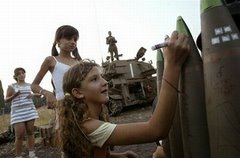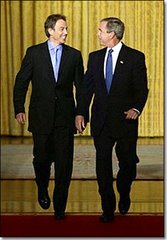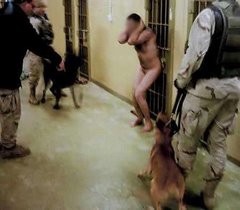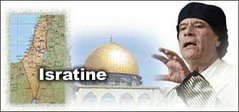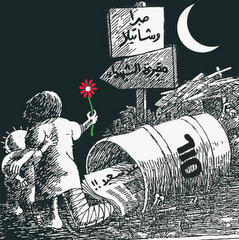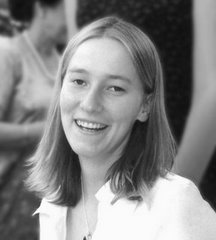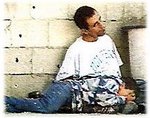
Ahmadinejad is locked in a tense standoff with the US over uranium enrichment and influence in Iraq [AFP]
Posted By Aljazeera.net
The Iranian president has left on a Latin American tour of Venezuela, Ecuador, Bolivia and Nicaragua, countries whose governments are critical of Washington.
bodyVariable350="Htmlphcontrol1_lblError";
Mahmoud Ahmadinejad will hold talks with his ideological "brother" Hugo Chavez, the Venezuelan president, on the start of his tour.
In Caracas, the two leaders were expected to sign a series of new trade and economic co-operation agreements.
bodyVariable300="Htmlphcontrol2_lblError";
"Iran and Venezuela are two important allies on a global level, the two countries have important industrial and oil projects which we will follow up in this trip," Ahmadinejad said before flying from Tehran.
Ahmadinejad has praised Chavez for his outspoken support of Iran's nuclear program, which the US and European governments say is part of a project to build atomic weapons.
Facing sanctions imposed by the UN Security Council over its uranium enrichment work and the threat of international isolation, Iran is keen to demonstrate it has backing among a number of leaders in Latin America.
Venezuelan support
Chavez is the most vocal supporter in Latin America for Iran and its president, with both men calling each other "brother" and relishing their status as fierce opponents of Washington's influence.
"Hugo is my brother," Ahmadinejad said during his last visit to Venezuela in September, when the two leaders inaugurated a joint oil well. "Hugo is the champion of the fight against imperialism."
In September 2005, Venezuela was alone in opposing a resolution at the International Atomic Energy Agency (IAEA) that found Iran in violation of nuclear safeguards. Since then, Chavez has completely backed Iran's right to enrich uranium.
Iran and Venezuela are both important players in the Organisation of Petroleum Exporting Countries (Opec) and have signed numerous co-operation agreements in the energy sector and other fields.
During a visit to Iran last September, Chavez came out in support of Iran's nuclear program, as well as denouncing Israeli military operations in Lebanon.
The two presidents also signed deals covering iron and steel production, petrochemicals, pharmaceuticals and health care equipment, and munitions.
While Ahmadinejad seeks to cultivate Latin American allies, Condoleezza Rice, the US secretary of state, has headed to the Middle East to rally Arab support for a new US strategy in Iraq and to counter Iran's alleged interference in Iraq.
Before her departure, Rice warned that the United States would not be passive in the face of what she called Iran's "regional aggression".
"I think you will see that the United States is not going to simply stand idly by and let these activities continue," she said.
Ecuador ceremony
After his one-day visit to Caracas, Ahmadinejad plans to head to Managua to hold talks with Daniel Ortega, Nicaragua's president and a US Cold War foe.
On Monday, Ahmadinejad will take part in the swearing-in ceremony of Ecuador's new president Rafael Correa, who has vowed to forge stronger ties with Venezuela and not to renew a lease for a US military air base on the country's Pacific coast.
The Iranian president will also hold meetings with other South American presidents including Bolivia's Evo Morales on the sidelines of the ceremony in Ecuador, before finishing his tour on Tuesday.
In September 2005, Venezuela was alone in opposing a resolution at the International Atomic Energy Agency (IAEA) that found Iran in violation of nuclear safeguards. Since then, Chavez has completely backed Iran's right to enrich uranium.
Iran and Venezuela are both important players in the Organisation of Petroleum Exporting Countries (Opec) and have signed numerous co-operation agreements in the energy sector and other fields.
During a visit to Iran last September, Chavez came out in support of Iran's nuclear program, as well as denouncing Israeli military operations in Lebanon.
The two presidents also signed deals covering iron and steel production, petrochemicals, pharmaceuticals and health care equipment, and munitions.
While Ahmadinejad seeks to cultivate Latin American allies, Condoleezza Rice, the US secretary of state, has headed to the Middle East to rally Arab support for a new US strategy in Iraq and to counter Iran's alleged interference in Iraq.
Before her departure, Rice warned that the United States would not be passive in the face of what she called Iran's "regional aggression".
"I think you will see that the United States is not going to simply stand idly by and let these activities continue," she said.
Ecuador ceremony
After his one-day visit to Caracas, Ahmadinejad plans to head to Managua to hold talks with Daniel Ortega, Nicaragua's president and a US Cold War foe.
On Monday, Ahmadinejad will take part in the swearing-in ceremony of Ecuador's new president Rafael Correa, who has vowed to forge stronger ties with Venezuela and not to renew a lease for a US military air base on the country's Pacific coast.
The Iranian president will also hold meetings with other South American presidents including Bolivia's Evo Morales on the sidelines of the ceremony in Ecuador, before finishing his tour on Tuesday.






